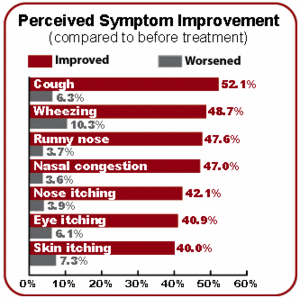The most important relationship I seek to nurture in the treatment room is the one a patient has with their own body. We live in a culture that teaches us to override pain, defer to outside authority, and push through discomfort. Patients often arrive hoping I can “fix” them, but the truth is, we can’t do the work for them. We can offer guidance, insight and support, but healing requires their full participation.
The Dog Days of Summer
According to the American Academy of Allergy, Asthma and Immunology, more than 50 million Americans suffer from some sort of allergy. Allergies are the sixth leading chronic disease, costing the U.S. health care system more than $18 billion annually. A study from National Yang Ming University in Taipei published in the June issue of Evidence-Based Complementary and Alternative Medicine, suggests application of Chinese herbs can treat allergies, using a method known as sanfujui.
Sanfujui is a method of herb treatment whereby an herbal medicine paste is applied to the Fengmen and Feishu acupoints during the three hottest days of the summer. According to the study authors, those three days have the highest amount of yang qi, so treatment at that time enhances the herbs' efficacy and strengthens lung qi.

In their study, the authors used an herbal paste composed of equal parts dried bai jie zi (Semen sinapis albae), dried xi xin (Herba asari), dried gan sui (Radix kansui), dried yan hu suo (Rhizoma cordalis) and fresh ginger (Zingiber officinale). The herbs were powdered and then combined with the juiced ginger to form a paste.
The most common allergic symptoms at baseline among the 119 study subjects were allergic rhinitis (61 percent), asthma (37 percent) and allergic eczema (25 percent). More than 75 percent of subjects had nasal congestion and runny noses, and more than half reported coughing, itchy nose and eyes, and dark circles around the eyes.
Patients received treatment during the three hottest days of summer in 2003 #8211; July 16, July 26 and Aug. 15. One year after treatment, 105 of these patients were contacted to determine treatment reaction and perceived efficacy. They were asked about allergy attacks and changes in medication use for allergies. Patients were asked to rate the efficacy of the treatment as very effective, somewhat effective, no change, or worse than before treatment.
When symptom severity at one week after treatment was compared to symptom severity before treatment, 24 percent to 52 percent of patients noted an improvement. For all but one symptom, at least 40 percent of patients said their symptoms had improved.
At one year after treatment, many of these improvements were maintained. Twenty-three percent reported that the treatment was "very effective," and 36 percent reported it as "somewhat effective." In terms of the number of allergic attacks during the period, 44 percent of subjects reported that the number of attacks had decreased, while 23 percent reported decreases in their drug use for allergies.
In discussing the implications of their findings, the authors noted, "The results demonstrated that the Sanfujiu treatment was moderately effective, as perceived by patients, in treating their allergic symptoms. ... Sanfujiu is appealing since it is non-invasive, reactive symptoms are minor, and the course is relatively short and easy." They note the absence of a control group and admit the possibility of a placebo effect, suggesting the need for further randomized, controlled, trials.
To download this study in full, click here.



